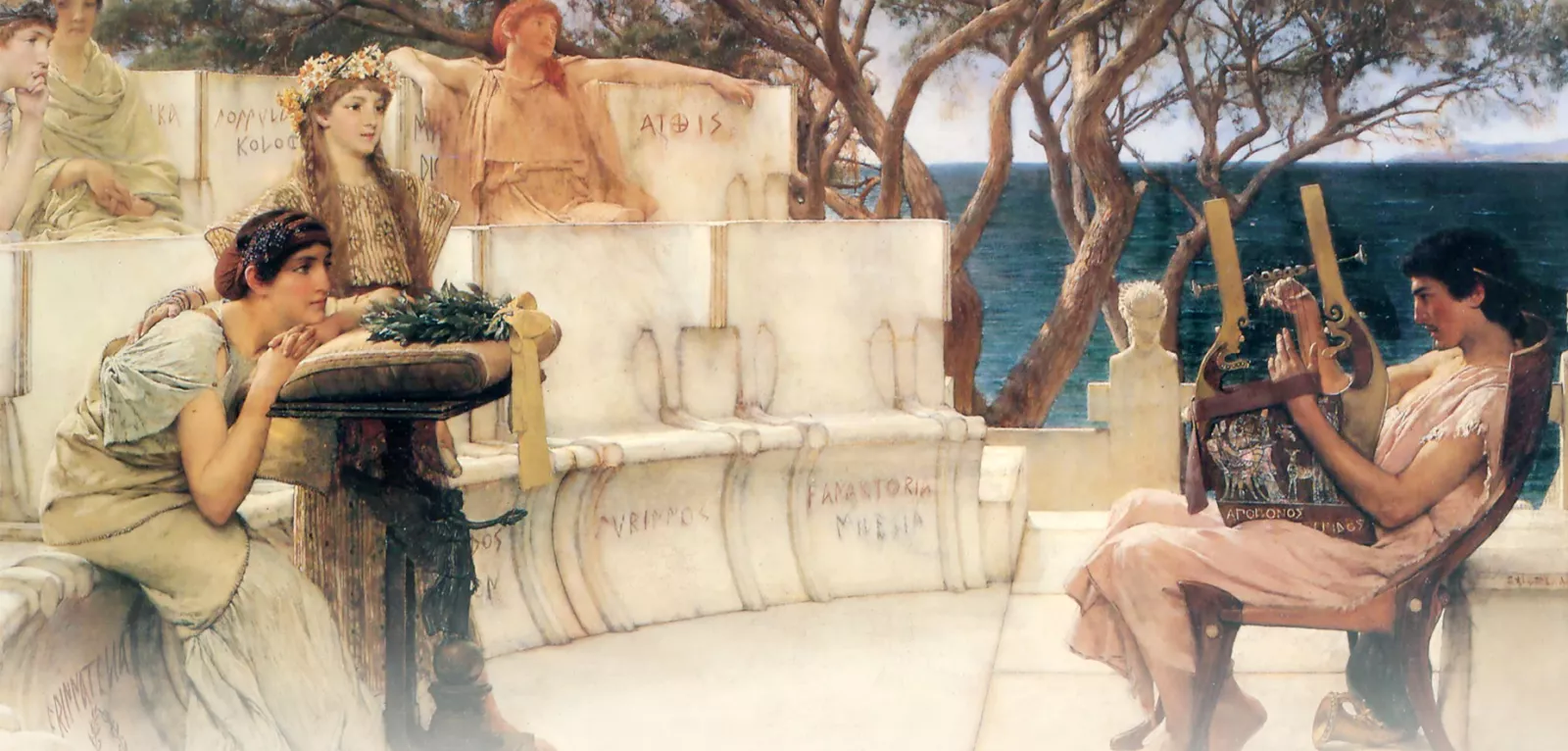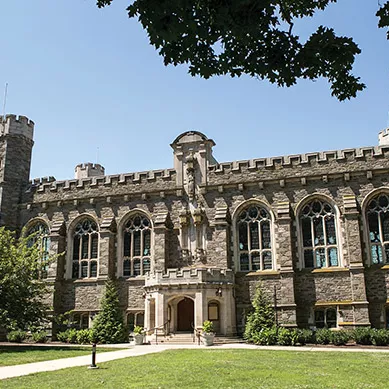
Colloquia and Events
The weekly Classics Colloquium provides an informal meeting ground for the College's lively community of undergraduates, graduate students, and faculty who are interested in classical subjects. Each year, the series brings to campus many distinguished speakers on a variety of literary, archaeological, and historical subjects.
Unless otherwise noted, all Colloquia will take place at 4:30 p.m. in Room B21 of the Rhys Carpenter Library on the campus of Bryn Mawr College. Tea will be held at 4 p.m. in the Quita Woodward Room, Old Library. For information call 610-526-5083; or email llawrence@brynmawr.edu. * if noted with an asterisk the announcement is not a colloquia but a special event. Please read event for location.
Spring 2026 Classics Colloquia
Friday, January 23
Lee Pearcy
Bryn Mawr College
"Casts as Classical Reception at the Pennsylvania Academy of the Fine Arts"
Carpenter Library B-21
4:30 pm - 5:30 pm
Bryn Mawr College
Tea at 4 pm in the Quita Woodward Room
Click here to watch the Zoom event recording.
Recent scholarship on plaster casts from Greek and Roman sculpture has not illuminated the collection whose acquisition marked the beginning of the Pennsylvania Academy of the Fine Arts in 1805. In this talk I will explore the roles of multiple agents in the founding of that collection and of PAFA and argue for the crucial role of the sculptor Jean-Antoine Houdon in the collection’s formation. I will also take a brief look at the first collection as part of classical reception in early nineteenth-century Philadelphia and at tensions between artists and cultural capitalists in that period.
Friday, January 30
Sheila Murnaghan
University of Pennsylvania
Senior Majors Speaker
Carpenter Library B-21
4:30 pm - 5:30 pm
Bryn Mawr College
Tea at 4 pm in the Quita Woodward Room
Click here to watch the Zoom event recording.
Recent work in cognitive literary studies has drawn attention to the question of whether, when, and how consumers of imaginative literature respond differently to fictional scenarios than to real ones. One significant factor is the degree to which readers and viewers are conscious of the author as the inventor and orchestrator of the events portrayed. Such awareness may result in a more divided or detached response, but the perceived activity of the author can inspire equally intense emotions as the behavior of fictional characters, including delighted approval, frustration, dismay, or even a sense of betrayal. This talk will explore emotional engagement with the author as a feature of classical Greek literary culture, starting from two famous scenes of a god’s response to fiction: Athena’s extreme pleasure in Odysseus’ invented tale in Odyssey 13 (288-95) and Dionysus’ longing for Euripides after reading his Andromeda in Aristophanes’ Frogs (66-67). I will draw primarily on examples involving classical Athenian drama, in which the context of competition fostered a heightened attunement to authorship among spectators, and in which comedy itself frequently thematized the relationship between playwrights and their audiences.
Friday, February 6
Adrian Robu
Université Paris
"8 Vincennes Saint-Denis, The Ancient Federalism in Question: the relations of Megara with the Achaian League and the Boiotian Confederacy"
Carpenter Library B-21
4:30 pm - 5:30 pm
Bryn Mawr College
Tea at 4 pm in the Quita Woodward Room
Click here to watch the Zoom event recording.
The city of Megara controlled a key region in Antiquity, the Megarid, a narrow strip of land connecting Central Greece and Attica to the Peloponnese. Megara possessed two main ports on the Corinthian Gulf, Aigosthena and Pagai, two settlements that acquired the status of polis after the middle of the 3rd century B.C. The cities of the Megarid were the only Greek city-states that belonged to both Achaian and Boiotian koina in the Hellenistic period. Old and new inscriptions give us further information on the institutional changes adopted by the Megarians as member of the Achaian League and the Boiotian Confederacy. It becomes obvious that the civic institutions of the polis are influenced by its integration into federal states. My presentation will examine the connections between political transformation and external influences regarding the institutions and the epigraphic culture of Megara.
Friday, February 13
Lorenzo Ronchini
Universität Zürich
"Exegesis Through Quotations: Galen, Plato and the Body-Soul Relationship"
Carpenter Library B-21
4:30 pm - 5:30 pm
Bryn Mawr College
Tea at 4 pm in the Quita Woodward Room
Click here to watch the Zoom event recording.
The thesis of Galen’s treatise The Capacities of the Soul Follow the Mixtures of the Body is stated already in its title. Galen repeats it throughout the work and, by means of extensive quotations, argues that the best physicians and philosophers – namely Plato, Aristotle, and Hippocrates – agree with it. Despite this apparent clarity, the exact meaning of the verb ἕπονται, by which Galen describes the relationship between the soul’s δυνάμεις and the bodily κράσεις, has been the subject of prolonged scholarly debate. In this talk, I will show that an understanding of Galen’s thesis can be gained by focusing on his interpretation of Plato; and that, since this interpretation lies in the selection and commentary of the passages he cites, the Platonic quotations provide a key to reading the treatise as a whole. They reveal Galen’s engagement with the Laws and his intention, through exegetical practice, to overturn the Platonic thesis of the soul’s rule over the body.
Friday, February 20
Jennifer Devereaux
Harvard University
"Conditions of Interpretability: Predictive Structures in Ancient Thought"
Carpenter Library B-21
4:30 pm - 5:30 pm
Bryn Mawr College
Tea at 4 pm in the Quita Woodward Room
Click here to watch the Zoom event recording.
This talk examines a set of Greek and Roman practices—civic divination, judicial timekeeping, and literary representations of emotion—in order to articulate a shared temporal operation that has not been adequately theorized. Across ritual, law, and narrative, anticipation functions not as foresight directed toward future events, but as a formal mechanism that determines in advance when interpretation, response, or action must become binding. Read together, these practices disclose a common logic through which authority is produced by regulating closure: by fixing temporal thresholds at which deliberation ends and judgment takes effect, even as explanation remains partial or indeterminate. What comes into view is a class of predictive structures operating below the level of belief and justification. Rather than explaining outcomes or securing assent, they organize the timing of settlement—whether in ritual action, legal decision, or narrative arrest—within processes that would otherwise remain open. On this account, prediction names neither calculation nor prognosis, but a condition of intelligibility: the structuring of recognition, authority, and response through time.
Friday, February 27
Lindsey Mazurek
University of Indiana
"Reuse Practices in Roman Portraiture from Asia Minor: Views from the East and West"
Carpenter Library B-21
4:30 pm - 5:30 pm
Bryn Mawr College
Tea at 4 pm in the Quita Woodward Room
Click here to watch the Zoom event recording.
In his 1st century CE Rhodian Oration, the orator Dio Chrysostom complained that the people of Rhodes were committing an unbearable outrage: taking down old portrait statues, giving them new inscriptions, and re-erecting them to honor new individuals, mostly Romans. Scholars of Greek portraiture have largely taken Dio at his word, assuming that reuse was a new phenomenon that arose in the Greek-speaking world only because of the pressures of Roman imperialism. But if we look further afield in time and space, new contextual information offers a more complex picture of portraiture reuse in Roman Asia Minor. I survey three examples of reused portraiture from Asia Minor to think about why communities reused private portraits and what functions they expected these new sculptural assemblages to perform. I conclude by turning to Sardis, where 4th century BCE portrait bases are reused to hold statues of Lydian animals like lions and eagles, changing function to serve a new narrative function. At all three sites, local elites reused earlier portraits to manipulate narratives of time, bringing past, present, and future into a close and dynamic dialogue.
Friday, March 20
Helen North Memorial Lecture Swarthmore College
Constanze Guthenke
Oxford University
Carpenter Library B-21
4:30 pm - 5:30 pm
Bryn Mawr College
Tea at 4 pm in the Quita Woodward Room
Click here to watch the Zoom event recording.
Friday, March 27
Grad Student Symposium
Keynote Speaker: Egbert Bakker, Yale University
"Consumption: From Cannibalism to Capitalism"
Carpenter Library B-21
4:30 pm - 5:30 pm
Bryn Mawr College
Tea at 4 pm in the Quita Woodward Room
Click here to watch the Zoom event recording.
Friday, April 10
Agnes Michels Lecture
Patrice Rankine
University of Chicago
Carpenter Library B-21
4:30 pm - 5:30 pm
Bryn Mawr College
Tea at 4 pm in the Quita Woodward Room
Click here to watch the Zoom event recording.
Friday, April 17
Martin Ostwald Lecture at Swarthmore College
Richard Saller
Stanford University
"Pliny’s Natural History and The Quest for Comprehensive Knowledge"
Carpenter Library B-21
4:30 pm - 5:30 pm
Bryn Mawr College
Tea at 4 pm in the Quita Woodward Room
Click here to watch the Zoom event recording.
Friday, April 24
Stavroula Valtadorou
University of Edinburgh
"The Breach of Trust in Euripides’ Phoenix, Bellerophon, and Hypsipyle"
Carpenter Library B-21
4:30 pm - 5:30 pm
Bryn Mawr College
Tea at 4 pm in the Quita Woodward Room
Click here to watch the Zoom event recording.

Contact Us
Greek, Latin, and Classical Studies
Old Library 103
Bryn Mawr College
101 N. Merion Avenue
Bryn Mawr, PA 19010-2899
Phone: 610-526-5083
Radcliffe Edmonds, Chair redmonds@brynmawr.edu
Leslie Lawrence, Academic Administrative Assistant
Phone: 610-526-5083
llawrence@brynmawr.edu